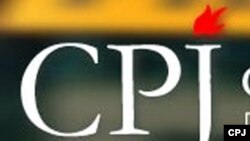International media rights organization the Committee to Protect Journalists (CPJ) has called on the authorities in South Sudan to ensure the safety of freelance journalist Abraham Agoth and others who have been harassed for their reporting during eight months of conflict in the country.
Agoth became concerned for his safety and went into hiding last month, CPJ East Africa Representative Tom Rhodes said, adding that his case is not isolated.
“Since this conflict began, I believe we have come across at least 10 cases -- and there are probably many more -- where journalists are harassed or threatened with arrest for their reporting," Rhodes said.
"It goes along with this notion that some of the authorities want journalists not to cover the conflict or at least cover only their side of the conflict," he said.
Agoth's problems began in early July when he was called to the office of Northern Bahr el Ghazal caretaker governor Kuel Aguer Kuel and questioned about his reporting of protests by shop owners in Aweil, who said the police were not doing enough to protect them from burglars.
Officials were also reportedly upset at Agoth’s reporting on security issues in the state, and he was warned not to report on attacks by rebels in the state.
That warning echoed what Information Minister Michael Makuei told South Sudan in Focus earlier this year -- that broadcasting or publishing interviews with rebel leaders inside South Sudan was "subversive activity" and could put the journalist on the wrong side of the law.
Journalists self-censor
Rhodes said the authorities' stance is leading journalists in South Sudan to self-censor their work at a time when the country needs accurate reporting.
"Maybe the biggest problem, the most pervasive problem journalists are facing now is the steady flow of intimidation, whether by the authorities or the rebel movement, to go silent, to self censor," he said.
"That is a very worrying trend for us, particularly at this time when South Sudanese citizens really need to know what is going on,” Rhodes said.
While there is a need for balanced and professional reporting, and officials are justifiably concerned with media reports that incite panic or violence, there is no reason for government officials to crack down on journalists during times of conflict.
Presidential spokesman Ateny Wek Ateny insisted that the conditions under which journalists work in South Sudan are not as bad as are being reported.
“I see South Sudan as one of the countries that allow freedom of expression... in the sense that even some journalists can contact the rebels and play the response of rebels inside South Sudan,” he said.
Ateny denied that tthe government has a policy of cracking down on the media but admitted that some journalists may have been harassed.
But he said any instances of harassment of journalists were "isolated" and could have happened "anywhere in the world."
Agoth reports for South Sudan in Focus, for the Gurtong Trust and independent newspaper, The Patriot.
Mugume Davis Rwakaringi reported from Juba.







